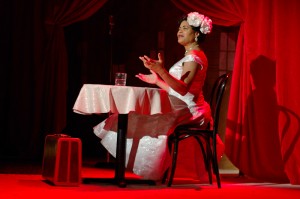“I go back where I came from to 6th Avenue/ and the tobacconist in the Ziegfeld Theatre and/ casually ask for a carton of Gauloises and a carton/of Picayunes, and a NEW YORK POST with her face on it/
and I am sweating a lot by now and thinking of/ leaning on the john door in the 5 SPOT/ while she whispered a song along the keyboard/ to Mal Waldron and everyone and I stopped breathing”
—Frank O’Hara, “The Day Lady Died”
EVERYONE AND I takes off from Frank O’Hara’s brilliantly nonchalant poem “The Day Lady Died,” about his New York City intellectual life being interrupted by news of Billie Holiday’s death. The play contrasts O’Hara’s (Mike Dees) apparently carefree existence with the Harlem hardships of Lady Day (Kimberly S. Fairbanks). (I’ve never seen contemporary footage of O’Hara, but Dees feels convincing as an effete intellectual; Fairbanks swaggers and sashays as though she might break into “Don’t Explain” with full Holiday voice.)

O’Hara is a giant of 20th century American poetry; Billie Holiday’s blues-laden voice remains heartbreaking. The play struggles to capture the concise insight of O’Hara’s poem or the tangible pain in Holiday’s singing, but it provides valuable context (life was far from carefree for a gay man in 1950s America) and an examination of the internal lives of the artist. And EVERYONE AND I is almost worth seeing just to be reminded of their genius.
March 28 to April 7, 2013, azukatheatre.org (co-presented with The American Poetry Review as part of the 2013 Philadelphia International Festival of the Arts, pifa.org).
